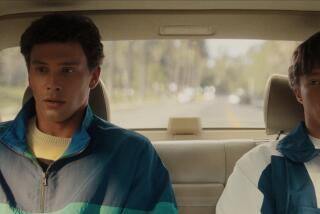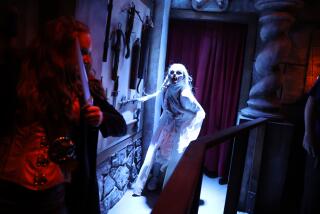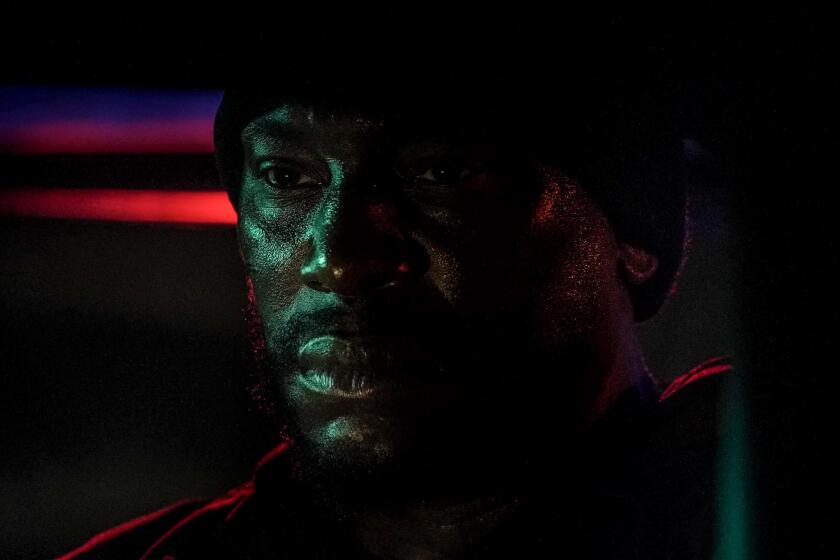MOVIES : OFF-CENTERPIECE : Time to Wake Up and End the ‘Nightmare’--<i> Hasta la Vista</i> , Freddy
Freddy’s dead.
When the sixth installment of the popular horror series “A Nightmare on Elm Street” opens Sept. 13, fans will witness the murder of the villainous Freddy Krueger--and the end of the line for “Nightmare,” New Line Cinema’s most lucrative franchise.
Why? “The controlling issue was an aesthetic one,” says New Line Chairman Robert Shaye. “We were bereft of creative inspiration. . . . There were still secrets, still unanswered questions lingering (about Freddy). Once we answer those, there’s not a lot more to do. So it’s appropriate and justified to bury the old guy.”
There were other factors behind Freddy’s demise. For one, Robert Englund, the actor who turned Freddy into one of the most popular horror villains in Hollywood history, had decided that he wanted to move on.
In addition, while the series has grossed more than $460 million in box-office and video sales, production costs continue to rise (the latest film cost $10.5 million, up from $7.5 million for “Nightmare 5”) while ticket sales have slowed. Box-office grosses reached a peak of $50 million with “Nightmare 4” in 1988 but dropped to $25 million for “Nightmare 5” in 1989.
“It gets to the point where our investment and creative energies could be better spent,” Shaye says.
The upcoming “Freddy’s Dead: The Final Nightmare” offers fans a new gimmick: Freddy’s demise takes place in 3-D “Freddy vision.” But that may not be consolation enough for fans distraught over Freddy’s death. Shaye says he has already received some angry mail, and adds that he won’t be surprised if there’s more to come. “It’s amazing how much sympathy a child molester can generate,” Shaye quipped.
New Line executives have plenty on their minds these days besides Freddy. The company is making a determined effort to tap the black, primarily youth, market with films set in the African-American community. It is distributing Joseph B. Vasquez’s critically acclaimed “Hangin’ With the Homeboys,” and this fall Topper Carew’s “Talkin’ Dirty After Dark,” set in a Watts comedy club, will be released.
Bill Duke--who directed “A Rage in Harlem”--is about to start production on New Line’s “Deep Cover,” an urban thriller that stars Larry Fishburne (“Boyz N the Hood”) and Jeff Goldblum (“The Fly,” “The Big Chill”). And New Line has several projects in development under its deal with Harry Belafonte, including a screenplay adaptation of August Wilson’s “Joe Turner’s Come and Gone.”
Of course, the company’s most popular black film so far is “House Party,” and a sequel is set for release Oct. 25. But that’s not the only movie series that New Line is pursuing in the wake of Freddy’s funeral: Preproduction is already under way on the third “Teenage Mutant Ninja Turtles” installment.
Shaye also has high hopes that “Tracker”--set for release next fall--will become a series. The film is based on the true story of a man who, after living with an Apache Indian, becomes such a skilled tracker that he can walk up to wild animals--or track down criminals by their footprints.
The tracker, whose real-life name is Tom Brown, went on to become a prominent naturalist and environmentalist. “The character is a fictional cross between Crocodile Dundee and Billy Jack,” Shaye says.
Is a heroic naturalist a fitting replacement for a creepy murderer like Freddy? “Don’t worry,” Shaye insists, “we haven’t given up our work boots for white shoes.”
More to Read
Only good movies
Get the Indie Focus newsletter, Mark Olsen's weekly guide to the world of cinema.
You may occasionally receive promotional content from the Los Angeles Times.










